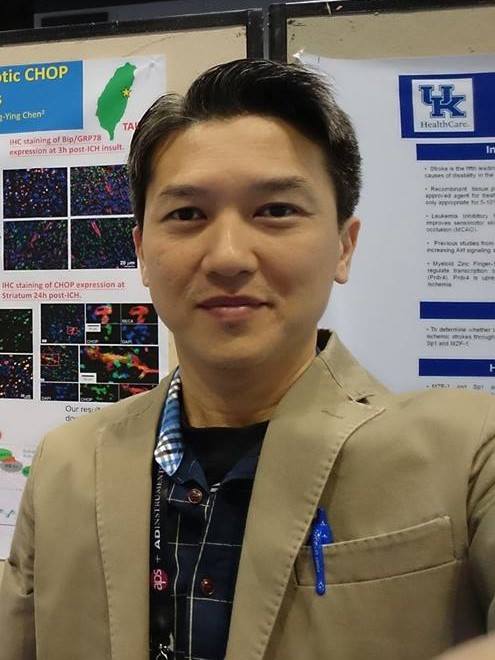 |
廖學健 副研究員 Dr. Liew, Hock-Kean | |
| E-mail:Email住址會使用灌水程式保護機制。你需要啟動Javascript才能觀看它 | ||
| 分機:15911 | ||
| National Defense Medical College, Taiwan. Ph.D. | ||
| 專長:System Biology, Neuroscience, Biomaterial & Scaffold, Brain Injury |
研究興趣:
| 腦中風是高死亡率之腦血管疾病。目前沒有任何有效的藥物可改善腦中風所造成的腦損傷。本實驗室以動物腦損傷(腦缺血&腦溢血)為實驗研究平台探討神經損傷的致病機轉,進而研發新的治療方法(藥物&幹細胞)。 過去的幾年間,我們的研究結果顯示G-CSF、Urocortin及幹細胞可能對腦損傷具有療效。亦已將相關的研究成果發表在國外知名的醫學雜誌。最近我們致力於探討神經幹細胞接合Urocortin對腦損傷的治療機制。神經幹細胞(Neural Progenitor Cells, NPCs)是動物神經系統中所有神經元及膠質細胞的前驅細胞。NPCs具有自我更新及分化成各種腦細胞之特性。因此移植或驅使內生性NPCs來修補腦損傷被認為是可能改善腦中風的方式。但是,腦損傷後造成的組織結構破損局限了移植NPCs的療效。NPCs移植到腦中的存活率非常低且鮮少分化成成熟的神經細胞。而尿皮質素(Urocortin)對腦溢血動物的腦損傷具有保護作用。我們曾證明Urocortin可促進NPCs之神經分化。研究之假說為Urocortin可能參與調控NPCs在腦損傷後的生長和分化能力,可增進移植NPCs在缺血性腦中風的存活及分化。我們擬探討Urocortin對於NPCs的增生及分化之影響及在慢性缺血性腦中風實驗,Urocortin對於NPCs的存活及分化之影響。此研究將有助於我們了解NPCs的治療模式是否具有療效,而Urocortin是否能進一步調控神經新生和促進移植細胞存活及分化。期望此嶄新的治療模式能有助於治療慢性缺血性腦損傷。 |
| Ischemic stroke is a major cause of morbidity and mortality worldwide. To date, no effective treatment is available to reverse the brain damage due to the difficulty to regenerate the matured neuron lost. Over the past few years, though the brain injury platform that we created (cerebral ischemic and cerebral hemorrhagic model), we are trying to establish new drugs and methods to reduce the neurological injury after brain injury. We demonstrated that G-CSF, urocortin and the Neural progenitor cells (NPCs) might possess beneficial effects against brain injury. Recently, our study focus on the combination of urocortin and the NPCs to treat cerebral ischemia. NPCs are considered the ultimate lineage precursors to all neuronal and glial cells. Because of their ability to self-renew, NPCs have promise for treatment of neurological diseases by transplantation therapy, and has been shown to promote recovery of neuronal functions after stroke. However, the disruption of the tissue architecture after brain injury limits the transplant efficacy. Besides, only a small proportion of grafted cells survived in the ischemic brain and rare differentiation to mature neurons. This massive loss of stem cells and rare differentiation to mature neurons post-engraftment is an impediment that lessens the effectiveness of cell transplantation therapy. Urocortin (UCN), a 40 amino acid peptide, which was first identified in rat midbrain. The function of this neuropeptide is to regulate neuroendocrine, autonomic, and immunologic responses to stress. Our results showed that, preconditioning with UCN conferred cytoprotection on NPCs and promoted their differentiation in an in vitro ischemia/reperfusion model. Therefore, we intended to clarify the role of UCN in modulating the NPCs survival, differentiation and the therapeutic efficacy of transplanted NPCs after chronic cerebral I/R injury. This study will provide a new insight into the potential of UCN by increasing survival and neuronal differentiation of transplanted NPCs, to repair the adult brain after chronic ischemic stroke in the future. |
成果發表(5年內):
|
1. |
Moderate Ethanol Pre-treatment Mitigates ICH-Induced Injury via ER Stress Modulation in Rats. |
|
2. |
A Role for Endoplasmic Reticulum Stress in Intracerebral Hemorrhage. |
|
3. |
The Role of Urocortins in Intracerebral Hemorrhage. |
| 4. |
Harnessing Neurogenesis and Neuroplasticity with Stem Cell Treatment for Addictive Disorders. |
| 5. |
Over-Activated Proteasome Mediates Neuroinflammation on Acute Intracerebral Hemorrhage in Rats. |
| 6. |
Brain Magnetic Resonance Imaging of Intracerebral Hemorrhagic Rats after Alcohol Consumption. |
| 7. |
Delayed formation of hematomas with ethanol preconditioning in experimental intracerebral hemorrhage rats. |
| 8. |
Collagenase-Induced Rat Intra-Striatal Hemorrhage Mimicking Severe Human Intra-Striatal Hemorrhage. |
